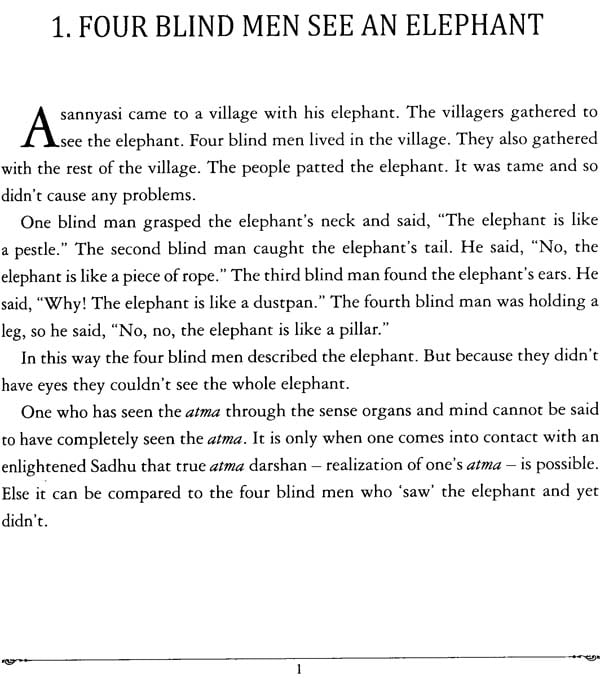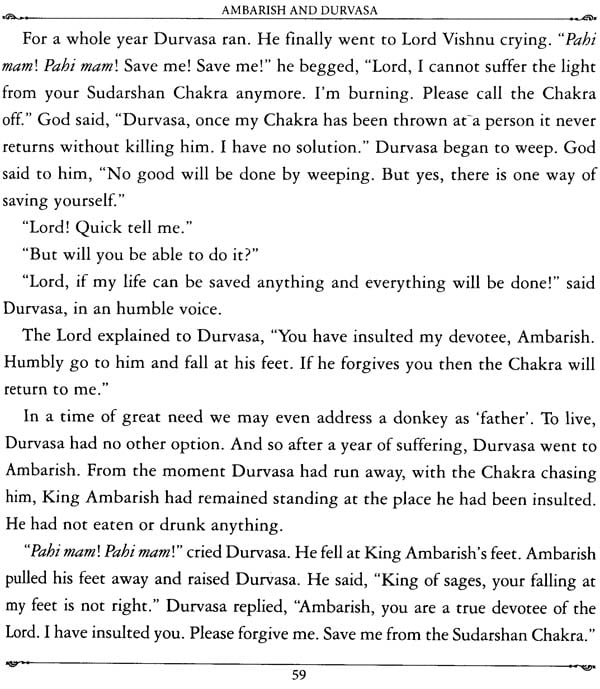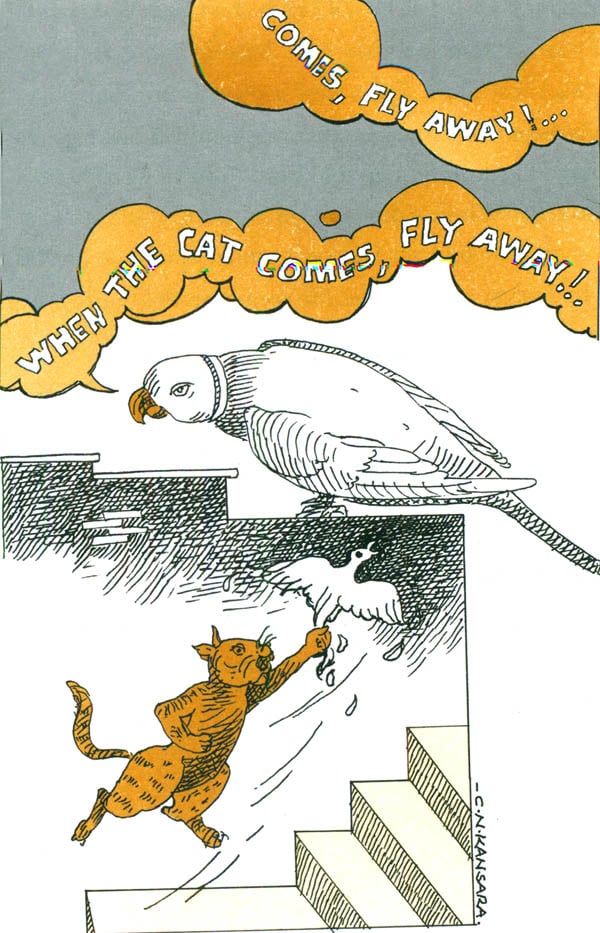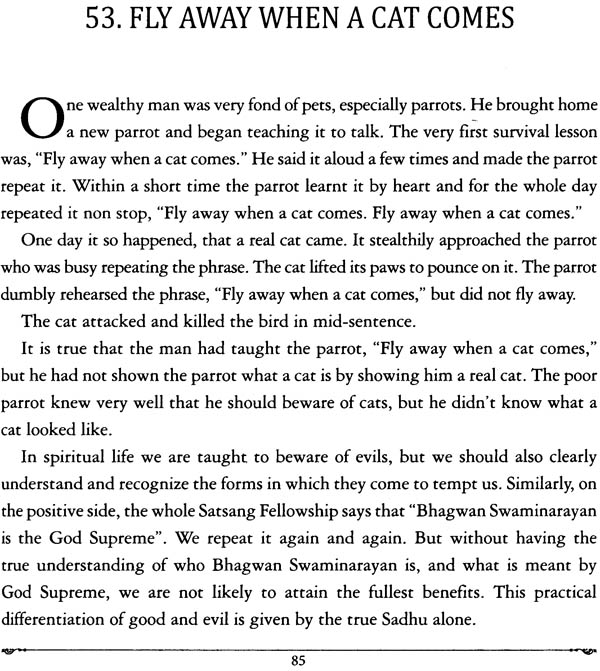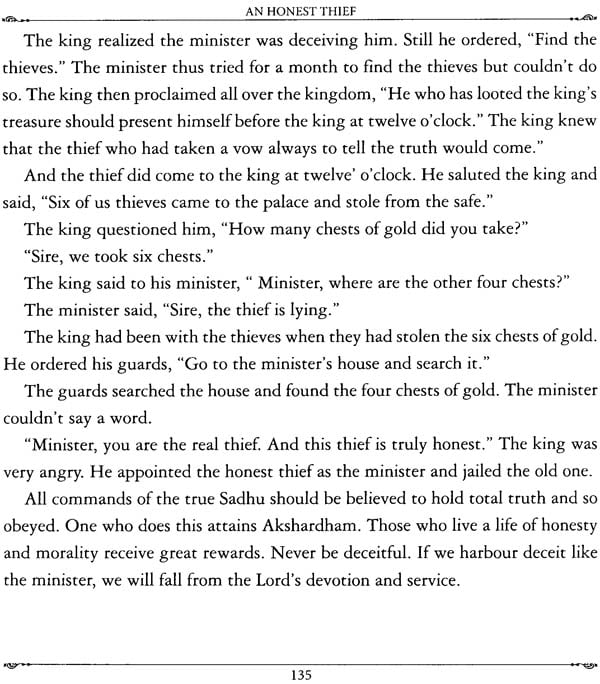
101 Tales of Wisdom as Told by Yogiji Maharaj
Book Specification
| Item Code: | IDL205 |
| Author: | Sadhu Brahmaviharidas |
| Publisher: | Swaminarayan Aksharpith Shahibaug Road, Amdavad, India |
| Language: | English |
| Edition: | 2015 |
| ISBN: | 9788175262720 |
| Pages: | 209 (8 B/W Illustrations) |
| Cover: | Paperback |
| Other Details | 7.8" X 8.8" |
| Weight | 270 gm |
Book Description
From the Jacket
Bochasanwasi Shri Akshar Purushottam Swaminarayan Sanstha (BAPS) is a global socio-spiritual organization committed to the moral and spiritual uplift of mankind. It was established in 1907 CE by Brahmaswarup Shastriji Maharaj in consonance with the Vedic teachings propagated by Bhagawan Swaminarayan (1781-1830 CE).
The Sanstha’s global network of over 3,300 moral, social, cultural and spiritual activities. The energies of the BAPS volunteer corps of 55,000 youths and over 780 sadhus are channeled towards a variety of philanthropic activities. BAPS is an NGO in Consultative Status with the Economic and Social Council of the United Nations. Its world renowned cultural complexes, like Akshardham in Gandhinagar and New Delhi, and traditional mandirs in London, Chicago, Houston, Atlanta, Toronto and Nairobi, are some of its epoch-making contributions to society.
BAPS, under the inspiration and guidance of Pramukh Swami Maharaj, has earned an endearing and unique place in the hearts of millions throughout the world.
Acclaimed as a unique and rare holy soul of India, Pramukh Swami Maharaj was born on 7 December 1921 CE in the village of Chansad, Gujarat. He is the fifth successor in the illustrious spiritual tradition of Bhagwan Swaminarayan and the embodiment of the universal Hindu ideals.
In his presence doubt dissolve, confusions clear, hurts heal and the mind finds peace. His selfless love and morality equally soothes and inspires children, youths and seniors; regardless of caste, creed or status.
Out of his compassion for humanity, he ha made over 15,500 village, town and city visits, sanctified over 250,000 homes, and read and replied to over 500,000 letters. He has ushered a cultural, moral and spiritual renaissance in India and abroad by establishing over 700 mandirs. His divine humanism has provided succour to countless souls in times of natural catastrophe and personal need.
His striking humility, simplicity and spirituality have touched many religious and national leaders. And above all, his profound experience and realization of God is the essence of his success and divine luster.
Preface
Of the oldest works of man, fairy tales and other folktales are probably the most loved. The most ancient of stories that we hear narrated around the world, researchers say, originated in Asia, in particular India. Throughout the world people added and omitted, changed and adapted the tales to their own life, local customs and culture.
Folktales originating in India have many distinctive messages – moral and spiritual in nature. Refined over the millennia, the stories have acquired a conciseness and rapidity of narration which are among their principal charms. Yogiji Maharaj’s folktales are not to be excluded from this class of stories.
His folktales appeal to the young and old alike. The tales were of all kinds: myths, legends, sagas, fables, comic stories, allegories. Some find their origin in India’s vast literary heritage. Others are from the annals of the Swaminarayan Sampraday. Still other stories he seems to have picked from the hustle and bustle of life around him, or at times he has spontaneously created tales from the bubbling childlike innocence that hallmarked his life.
His stories take place in a world inhabited by ordinary people, as well as by all manner of extraordinary characters: giants and dwarfs, cowards and heroes, evil doers and sages. In the midst of everyday affairs wonderful things happen; animals talk, people are transformed into dogs and dragons and back again. In this world, virtue is always rewarded and evil is punished. Worship of God is taught. The help of a true Sadhu is advised.
Invariably, while translating any language, some of the original charm and flavour is lost. Every effort has been made in this book to ensure that 101 Tales of Wisdom transmits the style, impact and enchantment of Yogiji Maharaj. All told, 101 Tales of Wisdom remains delightful and pleasing. This book is a rich storehouse containing many of the well-known and best loved stories. Messages cover a wide range of daily living. The stories are good to read and good to read aloud. Listening to them or reading them, children and adults will all experience some of the enduring wisdom of Yogiji Maharaj.
Tales told by Yogiji Maharaj have already gained widespread popularity. Children eagerly listen to them at bedtime and watch some adapted versions on video! Side by side sit enchanted parents who also read the collected works and narrate them during daily family spiritual time.
The book has been enlivened by excellent semi-symbolic sketches by C.N. Kansara of Amdavad. Inspired by His Holiness Pramukh Swami Maharaj, the direct spiritual successor of Yogiji Maharaj, Pujya Brahmavihari Swami is to be thanked for undertaking the translation work and producing a thoroughly enjoyable 101 Tales of Wisdom.
Introduction
To unravel ideas through stories is not simply a Hindu tradition but a human tradition. Every great leader has excelled in it. The Zen masters answered intricate questions and paradoxes through anecdotes. Jesus Christ spoke in parables. Ramakrishna Paramahansa profusely narrated stories. Bhagwan Swaminarayan simplified esoteric philosophy through day-to-day illustrations. The sermons of Gunatitanand Swami are alive withy stories and examples. And in this same galaxy shines the name of Yogiji Maharaj, one of the loftiest spiritual masters of this century.
His 79 years of presence on this earth, from 1892 to 1971, has left indelible impressions on the spiritual canvas of the world. Apart from his sublime life and experiences, his talks and revelations still resonate in the air. He spoke in the village patois, simple and straightforward. He never lectured, but talked. Even if it was to a packed assembly of 50,000 people, he spoke as if he were talking with individuals with total attention and care.
There was never a question of dressing up ideas in flowery language or veneering the truth with verbal cosmetics. Yogiji Maharaj spoke in plain words and presented the truths in their original, unadulterated, fresh form. When he spoke, his style was naturally picturesque and his gestures were grand, painting the stories in innocent language and visuals. The audiences listened and laughed, thought and wondered, but most of all they understood and grasped. Even if the same spiritual story came from his mouth a hundred times, people hung on to every world, every idea. Such was the magic of his talks.
In all, Yogiji Maharaj had at one time or another, during his talks, narrated more than 2,500 different stories. The learned sadhus who accompanied him noted them down. Of them, Pujya Viveksagar Swami kept the most detailed diary. He noted every word and gesture, writing and rewriting the stories word for word every time Yogiji Maharaj repeated them. From 1958 to 1970, a span of 12 years, Pujya Viveksagar Swami penned more than 25,000 pages of work. With great insight and efficiency, taking care not to prune or cut, alter or touch the original language and style of the great master, he took up the challenge of selecting pearl from an ocean of wealth. His devotion and dedication, coupled with his love for academics and authenticity has resulted in two books, in Gujarati, containing 469 value tales of Yogiji Maharaj. From them, 101 have been translated here. So long as Yogiji Maharaj’s tales of wisdom are among us, spiritual truths shall never be too difficult to grasp by people of all nations, of all ages, and of all aspirations.
Back of the Book
Anyone who heard Yogiji Maharaj once, came back for more.
It’s 8.00 p.m.
The small assembly hall in Gondal is barely full. In low yellow light, a handful of devotees are huddled around Yogiji Maharaj who is discoursing in his lovable village dialect. Suddenly, the atmosphere explodes with laughter. Before ripples settle down, another burst sends everyone rocking. Sometimes clapping, sometimes gesturing, Yogiji Maharaj often rubbed his palm on his head while speaking.
He had a simple way of revealing deep spiritual wisdom, Through everyday stories and folk tales, he opened the horizons of the heart, gave a new meaning to life. His tales of wisdom have become spiritual folklore.
Not one person, who has heard his tales, seen his gestures and experienced his inner joy and laughter can forget Yogiji Maharaj.
Perhaps, to remember him forever, hearing him Just once was enough.
| Preface | viii | |
| Introduction | x | |
| 1 | Four Blind Men See an Elephant | 1 |
| 2 | Holy Treasure Hunt | 2 |
| 3 | A Tapasvi’s Determination | 5 |
| 4 | The King Dies by Shuli | 8 |
| 5 | Just Getting Up! | 9 |
| 6 | Average Knee Deep | 10 |
| 7 | Take a Needle to Heaven | 11 |
| 8 | United We Win | 13 |
| 9 | Not a Servant of Brinjals | 15 |
| 10 | Giving Life to the Dead | 17 |
| 11 | Death Sentence Reduced to a Thorn Prick | 19 |
| 12 | True Friendship | 21 |
| 13 | Black Hansa in Kali-Yug | 23 |
| 14 | The Camel’s Neck | 26 |
| 15 | Cow or Tiger? | 27 |
| 16 | The Shrew | 29 |
| 17 | Shiv, Parvati and the Bull | 30 |
| 18 | “Don’t Look!” | 32 |
| 19 | The Letter Will Speak | 33 |
| 20 | Duryodhan and Yudhisthir | 35 |
| 21 | Kukaddam | 37 |
| 22 | Million Times Convinced | 40 |
| 23 | Whose Beard Will You Save First? | 42 |
| 24 | Hiro Goes to Ghosha | 43 |
| 25 | He Placed His Head Between the Cow’s Horns | 44 |
| 26 | Progress Without Praises | 46 |
| 27 | Tukaram | 47 |
| 28 | Free Clothing | 48 |
| 29 | God’s Will or My Skill! | 50 |
| 30 | The Pround Chaaran | 51 |
| 31 | Janak and the Nine Yogeshwars | 53 |
| 32 | Day Dreamer | 55 |
| 33 | The Camel’s Lip | 56 |
| 34 | ‘I’ve Seen You!” | 57 |
| 35 | Wise Men Think Alike | 59 |
| 36 | Ambarish and Durvasa | 61 |
| 37 | Life Is but a Dream | 65 |
| 38 | A Mountain of Vegetables | 67 |
| 39 | A Coppersmith’s Cat | 68 |
| 40 | All Things Come and Go | 69 |
| 41 | Today and Everyday | 70 |
| 42 | Is Your Father Chewing for Me! | 71 |
| 43 | True Justice | 73 |
| 44 | A Quiver of Arrows | 74 |
| 45 | Patience | 75 |
| 46 | The Lazy Man | 76 |
| 47 | Janak Videhi | 77 |
| 48 | The Old Lady’s Bones | 81 |
| 49 | The Sesame Scholar | 84 |
| 50 | Tumbaru and Narad | 85 |
| 51 | The Goddess’s Shadow | 87 |
| 52 | A Potter Wins the Lottery | 89 |
| 53 | Fly Away When a Cat Comes | 91 |
| 54 | The Sick Man’s Bed Is Inside | 93 |
| 55 | The Ghost and the Pole | 94 |
| 56 | The Strength of Ghee | 96 |
| 57 | The Foolish Son | 97 |
| 58 | The Donkey and the Ox | 101 |
| 59 | The Skill of a Sannyasi | 103 |
| 60 | Never Hide Your Guru | 105 |
| 61 | Patel Wins the Bet | 108 |
| 62 | Beating up Darkness | 111 |
| 63 | Force 99 | 113 |
| 64 | The Garashiyo and the Ghanchi | 115 |
| 65 | Bumble Bee and Worm | 117 |
| 66 | The Devotee and the Thief | 119 |
| 67 | Let Go the Blanket! | 120 |
| 68 | The Glass Eye | 121 |
| 69 | An Imposter Guru | 122 |
| 70 | The Ugly Man and the Mirror | 124 |
| 71 | A Clever Wish | 125 |
| 72 | The Monkey, the Snake and the Goat | 126 |
| 73 | Strange Memorial Stones | 129 |
| 74 | Devotion Without Purpose | 132 |
| 75 | Night Complains to God | 133 |
| 76 | Adu or Nadu? | 134 |
| 77 | A Horse Breaks a Leg | 136 |
| 78 | Who Killed the Brahmins? | 137 |
| 79 | ‘Tam Snanam Am Snanam!’ | 139 |
| 80 | Four Finger Faith | 141 |
| 81 | A Humble Servant of God | 142 |
| 82 | Tricking God | 143 |
| 83 | An Honest Thief | 144 |
| 84 | Become a Dog | 149 |
| 85 | The Greedy Pujari | 151 |
| 86 | But Why Did You Speak? | 153 |
| 87 | Lindiyo – the Lion Goat | 155 |
| 88 | Kakadhiraj | 157 |
| 89 | The Robin | 159 |
| 90 | Greatness of Satsang | 163 |
| 91 | Money! Money! | 166 |
| 92 | ‘Two I Have Done, You Do One!’ | 169 |
| 93 | The Calf Tries to Suckle the Bull | 170 |
| 94 | A Million Rupee Diamond | 171 |
| 95 | The Illusionist | 174 |
| 96 | The Unity of the Doves | 177 |
| 97 | Mother Monkey Stands on Her Baby | 178 |
| 98 | Aruni and Upmanyu | 179 |
| 99 | Evil Money | 182 |
| 100 | Horse Riding from a Book | 183 |
| 101 | Deshal and Zakharo | 184 |
| Glossary | 186 |

